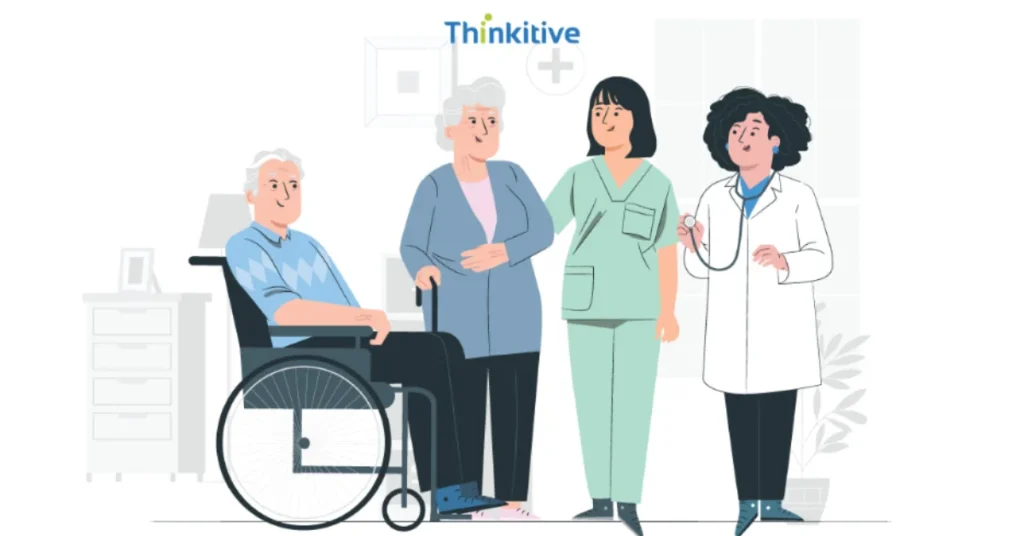It is not a secret that the healthcare industry is one of the most well-coordinated industries in the world. Every aspect of care delivery depends on other healthcare professionals which include care providers, clinical administrative staff, and even other sectors of the healthcare industry like pharmacies, test laboratories, etc.
Despite being one of the most well-coordinated sectors, custom healthcare software solutions have effectively closed the gaps by enhancing communication, collaboration and fostering coordination.
Having said that, the specific sector of the healthcare industry that is in dire need of enhanced coordination is home healthcare. Given its unique offerings of care delivery, streamlining care coordination is quite difficult in its traditional code of conduct of practice. Care gaps are often felt and seen due to fragmented care, lack of visibility to providers into patient progress, and inefficient information sharing amongst the care team members.
That is the reason why many home healthcare agencies are turning to custom home healthcare software development for their practice!
Healthcare technology solutions in home healthcare are seen as a preferable solution to streamline care coordination by improving communication and collaboration with an aim to improve patient care. In this way, the home healthcare software solutions are trying to create a win-win situation for home healthcare agencies and patients.
In this blog, let’s see how custom home healthcare platforms can streamline care coordination for your home care agency!
ALSO READ: Legal Essentials for Hotel Owners: Protecting Your Business and Enhancing Guest Experience
Centralized Patient Information Platform
When you opt for the home healthcare software development process, you get an opportunity to create a centralized patient records platform with real-time communication tools. Bringing flexibility into your operations, accessing and managing patient information becomes much easier for the care team members.
Some of the key features that you can include in your centralized platforms are as follows:
- Real-time Updates: Real-time communications tools also act as care coordination tools which enables seamless sharing of information across all the stakeholders and people involved in the care team.
- Comprehensive Patient Charts: Personalized patient charts to provide accurate and real-time information about the entire patient care history and journey making it easier to deliver the required care and make informed decisions in time.
- EHR Integrations: EHR integration with your custom home healthcare software enables viewing of patient health information, further bridging the gaps in communication and bringing transparency in patient information sharing.
By having a centralized platform, you equip your care team members and patients with a dedicated platform that they can use for communication. This empowers them to collaborate with each other in a better way and make informed care decisions to improve patient health outcomes.
Real-time Communication & Collaboration Tools
Effective communication holds the key to building a collaborative landscape in healthcare. Further extending its reach in home healthcare services, it lays the foundation for a collaborative ecosystem between care team members, patients, and caregivers.
Here are some of the real-time communication tools that you can include in your custom home healthcare software:
- Secure Messaging: Enabling caregivers, providers, and patients to securely message each other and coordinate for better care.
- Video Conferencing: This allows real-time live consultations with the care team members and patients to ensure optimum care is being delivered or in case of any complications.
- Document Sharing: Being a data-oriented practice, this feature allows caregivers to share documents with patients, case managers, and providers, to make informed decisions for patient health improvement.
All these care coordination tools mentioned above promote a collaborative framework in the home healthcare ecosystem. By improving communication, collaboration, and coordination in care delivery, every aspect of this is aimed at improving patient health outcomes.
Automated Workflow & Task Management
Home healthcare services include both clinical and non-clinical care. Along with that, since most of the patients availing of home care services are elderly population, the tasks are often challenging. It also complicated the workflow for case managers and caregivers.
Though traditional methods involve a lot of manual labor, with custom home healthcare software development, managing these complex workflows can be automated while bringing ease in task management and assignment.
For instance, when the patient books an appointment after consultation with the provider, the system automatically analyzes its care requirements and finds a caregiver in a defined geographical proximity with relevant skills. This way the workflow can be automated and the case manager can easily manage the tasks of caregivers. Along with this, it also helps in the progress tracking of patients, allowing your home care agency to take a holistic approach.
In this way, with automated workflow and easy task management, most of the clinical and administrative processes are streamlined. It also allows caregivers to focus more on care delivery improving their efficiency and reducing the chances of errors.
Remote Patient Monitoring & Telehealth
Patient vitals are a crucial element for providing optimum care, however, it can be a little difficult given the remote nature of home care services. This is where remote patient monitoring and telehealth come into the picture to equip caregivers and providers with the data to provide the right care.
For instance, after integrating your custom home healthcare software with wearable devices to collect patient vitals, the collected data can be directly transmitted to the providers’ system. After analyzing and curating the initial care plan, the provider can schedule a virtual visit with the help of an integrated telehealth platform. Here the right care plan can be decided and forwarded to the caregiver to deliver the right care to the patient.
Along with this, with remote patient monitoring you can access patient’s vitals in real time and ensure they are on the path to recovery. These features work collaboratively to help care team members provide the necessary care to improve patient outcomes. It also reduces hospitalizations and enhances patient satisfaction levels with enhanced care delivery.
Predictive Analytics & Risk Stratification
As home care agencies are moving towards a completely digital landscape, the practices are becoming more and more data-oriented. This data has been used to improve accuracy in care delivery and ensure the care team members collaborate in the right way to provide the best possible care.
Having said that, your custom home healthcare system collects a lot of different types of data. This is where predictive analytics and risk stratification features come into the picture to assist caregivers, providers, and case managers to take effective preventative measures and provide the best possible care.
With predictive analytics, caregivers can easily identify patients who are at high risk. In such cases, an early intervention plan can be drawn out to improve patient outcomes. These features help in providing better preventive care which is an integral part of home healthcare services.
Integration with Other Healthcare Systems
Every feature that we’ve discussed above contributes in some or the other way to streamlining care coordination. However, as we discussed earlier, the healthcare industry highly relies on its various sectors. Your software’s integration with these digital health platforms is crucial to improve care coordination, collaboration, and communication between patients, providers, and caregivers. Some of these digital health platforms include EHRs, pharmacies, laboratories, etc.
To ensure seamless integration with these healthcare technology solutions, custom home healthcare software needs to achieve interoperability. With interoperability and robust APIs exchange of information between these systems becomes much easier and in the right way.
Furthermore, with custom home healthcare software development the bedrock for integration can be set at early stages, which makes your software a one-stop solution for all your home care needs. Along with that, this integration also improves data sharing, reduces errors, and enhances care coordination, assisting caregivers and care team members to make informed decisions to help patients improve their health outcomes.
Conclusion
Custom home healthcare software can help you streamline the entire clinical and non-clinical aspects of your home care agency. From allowing caregivers to provide accurate care and making their lives easier to allowing case managers to effectively manage tasks for caregivers, healthcare technology solutions for home care agencies set the foundation and streamline every aspect of care coordination.
On that note, if you’re a home care agency owner then given the digital wave of healthcare transformation, this is the right time to invest in healthcare technology solutions for home care agencies.
So, let’s start your custom home healthcare software development journey today.
Frequently Asked Questions
- What are custom home health care solutions?
Custom home health care solutions are personalized care plans tailored to meet the specific needs of individuals in their own homes. These plans can include a variety of services, such as skilled nursing, therapy, personal care assistance, and medication management. They are designed to help people maintain their independence and quality of life while receiving the care they need.
- How can custom solutions improve care coordination?
Custom solutions can significantly enhance care coordination by:
- Tailoring workflows: They can be designed to fit specific healthcare settings and processes, eliminating inefficiencies.
- Integrating systems: Custom solutions can seamlessly integrate with existing EHRs and other systems, ensuring data accuracy and accessibility.
- Providing real-time insights: They can offer real-time data analytics, enabling proactive care management and timely interventions.
- Improving communication: Custom solutions can facilitate better communication among healthcare providers, patients, and caregivers, leading to improved outcomes.
- What features should I look for in a custom home healthcare solution?
When choosing a custom home healthcare solution, consider these key features:
- Personalized Care Plans: Tailored to individual needs and preferences.
- Experienced Caregivers: Qualified and compassionate professionals.
- Comprehensive Services: From medication management to companionship.
- 24/7 Support: Reliable assistance whenever needed.
- Transparent Communication: Open and honest interactions with caregivers and care coordinators.
- Flexibility: Ability to adjust services as your needs change.
- Safety and Security: Prioritization of patient safety and well-being.
- Affordable Pricing: Competitive rates and flexible payment options.
- Can custom solutions integrate with existing healthcare systems?
Yes, custom solutions can integrate with existing healthcare systems. Custom solutions are designed to be tailored to specific needs, making them highly adaptable. This adaptability allows for seamless integration with various healthcare systems, such as electronic health records (EHRs), patient management systems, and billing software. Integration ensures that data flows smoothly between different systems, improving efficiency and reducing errors.
- How do I get started with implementing a custom home healthcare solution?
Here’s a breakdown of the steps involved in implementing a custom home healthcare solution:
- Define Your Goals: Clearly outline the specific needs and objectives of your home healthcare service.
- Assess Existing Resources: Evaluate your current infrastructure, staff, and technology capabilities.
- Choose a Technology Partner: Select a reliable technology provider that specializes in home healthcare solutions.
- Develop a Comprehensive Plan: Create a detailed plan that covers implementation, training, and ongoing support.
- Pilot and Refine: Conduct a pilot program to test the solution and make necessary adjustments.
- Launch and Scale: Implement the solution across your organization and continuously monitor its performance.
- What are the main challenges in care coordination for home healthcare providers?
Challenge 1: Communication and Collaboration
- Fragmentation: Home healthcare providers often work in silos, leading to poor communication and coordination.
- Technology Barriers: Lack of standardized electronic health records and communication tools can hinder information sharing.
Challenge 2: Patient Engagement and Adherence
- Complex Care Plans: Patients may struggle to understand and follow complex care plans.
- Lack of Support Systems: Patients may lack social or family support to help them manage their care.
Challenge 3: Resource Constraints
- Limited Staffing: Home healthcare providers may face shortages of skilled staff.
- Financial Challenges: Reimbursement rates may be inadequate to cover the costs of care.
- How can data analytics enhance care coordination in home health care?
Data analytics can significantly improve care coordination in home health care by:
- Identifying care gaps: Analyzing patient data can reveal gaps in care, ensuring timely interventions.
- Predicting patient needs: Predictive analytics can anticipate patient needs, allowing for proactive care planning.
- Optimizing resource allocation: Data-driven insights can help allocate resources efficiently, ensuring optimal care delivery.
- Improving patient outcomes: By enhancing care coordination, data analytics can lead to better patient outcomes and satisfaction.
- What is the cost associated with implementing custom home healthcare solutions?
The cost of implementing custom home healthcare solutions can vary greatly depending on several factors, including the specific needs of the individual, the services required, the geographic location, and the provider’s pricing structure. It is recommended to request quotes from multiple providers and carefully compare the costs and services offered to find the best solution that fits your budget and needs.
- How do custom solutions ensure patient privacy and data security?
Custom solutions can ensure patient privacy and data security through:
- Tailored security measures: These can be designed specifically to address the unique needs and vulnerabilities of the healthcare organization.
- Data encryption: This involves transforming data into a code that can only be deciphered with a specific key, protecting it from unauthorized access.
- Access controls: These restrict access to patient data based on roles and permissions, ensuring that only authorized individuals can view and modify information.
- Regular updates and patches: This helps to keep the system up-to-date with the latest security vulnerabilities and fixes.
- What role does technology play in improving patient outcomes in home health care?
Technology plays a crucial role in enhancing patient outcomes in home health care by:
- Remote monitoring: Devices can track vital signs, allowing healthcare providers to intervene quickly if needed.
- Medication management: Apps can help patients manage their prescriptions, reducing the risk of errors.
- Virtual consultations: Telehealth enables patients to connect with healthcare providers from the comfort of their homes.
- Personalized care plans: Technology can create tailored care plans based on individual patient needs.
- Data analysis: Analyzing patient data can identify trends and improve treatment strategies.
- How can families get involved in the care coordination process?
Families can play a crucial role in care coordination by:
- Communicating regularly with healthcare providers about their loved one’s needs and preferences.
- Organizing medical records and ensuring they are accessible to all providers.
- Attending appointments and taking notes to help manage care.
- Asking questions and seeking clarification to ensure they understand the treatment plan.
- Advocating for their loved ones by expressing their concerns and ensuring their needs are met.
- What are the best practices for training staff on new home healthcare solutions?
Effective training for home healthcare staff on new solutions involves:
- Clear learning objectives: Define what staff need to know and be able to do.
- Hands-on practice: Provide opportunities to use the new technology in simulated scenarios.
- Mentorship and support: Assign experienced staff to guide and assist new learners.
- Ongoing training and updates: Keep staff informed about new features and best practices.
- Feedback and evaluation: Gather feedback to identify areas for improvement and measure training effectiveness.
- How do custom solutions support remote monitoring of patients?
Custom solutions can support remote patient monitoring by:
- Tailoring: Creating solutions that match specific patient needs and medical conditions.
- Integration: Connecting with existing healthcare systems for seamless data sharing.
- Real-time data: Providing immediate access to vital signs and other health metrics.
- Alerts: Triggering notifications for abnormal readings or changes in patient status.
- Privacy: Ensuring secure data storage and transmission.
- What are the latest trends in home healthcare technology?
Home healthcare technology is rapidly evolving. Some of the latest trends include:
- Remote patient monitoring (RPM): Devices that track vital signs and other health metrics, allowing healthcare providers to monitor patients remotely.
- Wearable devices: Smartwatches and fitness trackers that can track various health indicators and provide personalized health insights.
- Artificial intelligence (AI): AI-powered tools that can analyze patient data to identify potential health risks and improve care outcomes.
- Virtual reality (VR): VR-based therapies that can help patients with rehabilitation and pain management.
- How can I evaluate the effectiveness of a custom home healthcare solution?
Evaluating the effectiveness of a custom home healthcare solution involves several key factors:
- Patient outcomes: Measure improvements in health conditions, quality of life, and independence.
- Caregiver satisfaction: Assess caregiver workload, training effectiveness, and overall job satisfaction.
- Cost-effectiveness: Compare the solution’s cost to the benefits it provides, such as reduced hospitalizations or improved patient outcomes.
- Compliance and adherence: Monitor patient and caregiver adherence to care plans and protocols.
- Feedback: Collect feedback from patients, caregivers, and healthcare providers to identify areas for improvement.







